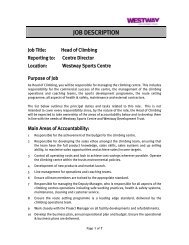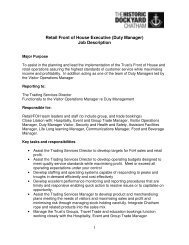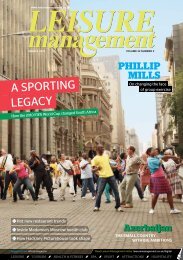Leisure Media Issue 3 2009 - Leisure Opportunities
Leisure Media Issue 3 2009 - Leisure Opportunities
Leisure Media Issue 3 2009 - Leisure Opportunities
- No tags were found...
Create successful ePaper yourself
Turn your PDF publications into a flip-book with our unique Google optimized e-Paper software.
VisitBritain’s new strategy willattempt to reach visitors througha focus on national and regionalbrands as well as the Britain brandwhere government policy could risk the visitor economy’s success,such as transport infrastructure investment, the high cost oftaxes and visas to enter the UK, and climate change legislation.Thanks to the research, there can be no doubt the visitor economyis a key part of the UK economy. But devolution, industryfragmentation, the free rider effect and the need to operate overa time frame at a level not reached by the typical SME meansgovernment’s role is critical. We can’t leave it to the industryand devolved authorities alone if we’re to reach our full potential.At a superficial level it’s clear that simple destination marketingis no longer enough. We have to market experiences. Or toput it another way, we have to recognise that few people go to anRDA for a holiday even if that’s the way the government choosesto hand out money. More importantly, the review team concludedthat without greater collaboration and coordination, our thrivingpast might be followed by a less certain future. And so the reviewlooked at what we have to do to improve our prospects.PHOTO: WWW.BRITAINONVIEW.COMVISITBRITAIN’S ROLESince the latest Comprehensive Spending Review fixed themoney available, this meant looking at ways to improve the efficiencyand effectiveness of VisitBritain’s relationship with theindustry and with other public sector bodies. It revealed a widespreadview that VisitBritain’s role should evolve to reflect therealpolitik of devolution and the maturing attitudes, capabilitiesand expectations of its strategic partners. And while peopleagreed that activities should be undertaken using the Britainbrand in some markets – particularly emerging ones – it wasclear that in territories nearer to and more familiar with Britain,it was time to recognise our portfolio of national and regionalAT A SUPERFICIAL LEVEL, IT’S CLEARTHAT SIMPLE DESTINATION MARKETINGIS NO LONGER ENOUGH. WE HAVETO MARKET EXPERIENCESbrands and to use whichever was best fit for purpose. Despitesome media claims, this doesn’t mean abandoning the Britainbrand entirely. There will still be some valuable promotional partnerships– particularly around the Olympics – that may only beavailable if everyone works together under a single brand.For VisitBritain, it means a strategy that will inspire the worldto explore Britain, delivering an invaluable global overseasnetwork to champion the national brands – Britain, England,London, Scotland, and Wales. It will enable us to remain theauthority on maximising the value of the visitor economy, forcoordinating the voice of British tourism policy, and for providingtransaction and technology platforms that extend the reachof industry to the consumer. The review also identified a criticalneed for VisitBritain’s sponsoring ministry, DCMS, to recognisethat many of the priorities for the industry are not in the handsof its ministers. Historically tourism has all too often been anafterthought. It needs to be on the checklist of every relevantminister and it is our job to work with DCMS to ensure that isthe case. One of the most important roles for the minister andsecretary of state is to ensure that tourism is taken into accountin decisions made across government departments.The review has also led to the establishment of VisitEnglandas a standalone, strategic leadership body, which for the firstISSUE 3 <strong>2009</strong> © cybertrek <strong>2009</strong>Read <strong>Leisure</strong> Management online leisuremanagement.co.uk/digital 43
















